In this edition
- Mapping the road to success | 4-H Where Wolves attend National GIS Conference
- University offers agricultural crop research tours at Fallon Field Day
- Molly Flagg Knudtsen | Her story is College history
- Photo gallery | Building a herd of partnerships at the Smith Creek Ranch
- National leader in renal disease joins University
About our College
A founding college of the University, we have a long tradition of excellence in teaching, research and engagement programs that benefit the health and economic vitality of Nevada. We offer programs in:
- agriculture, horticulture, rangeland & veterinary sciences
- biochemistry & molecular biology
- children, youth & families
- community & economic development
- health & nutrition
- natural resources & environmental science
Mapping the road to success
4-H Where Wolves attend National GIS Conference
By Ian McMurray, Where Wolves 4-H GIS/GPS Club member
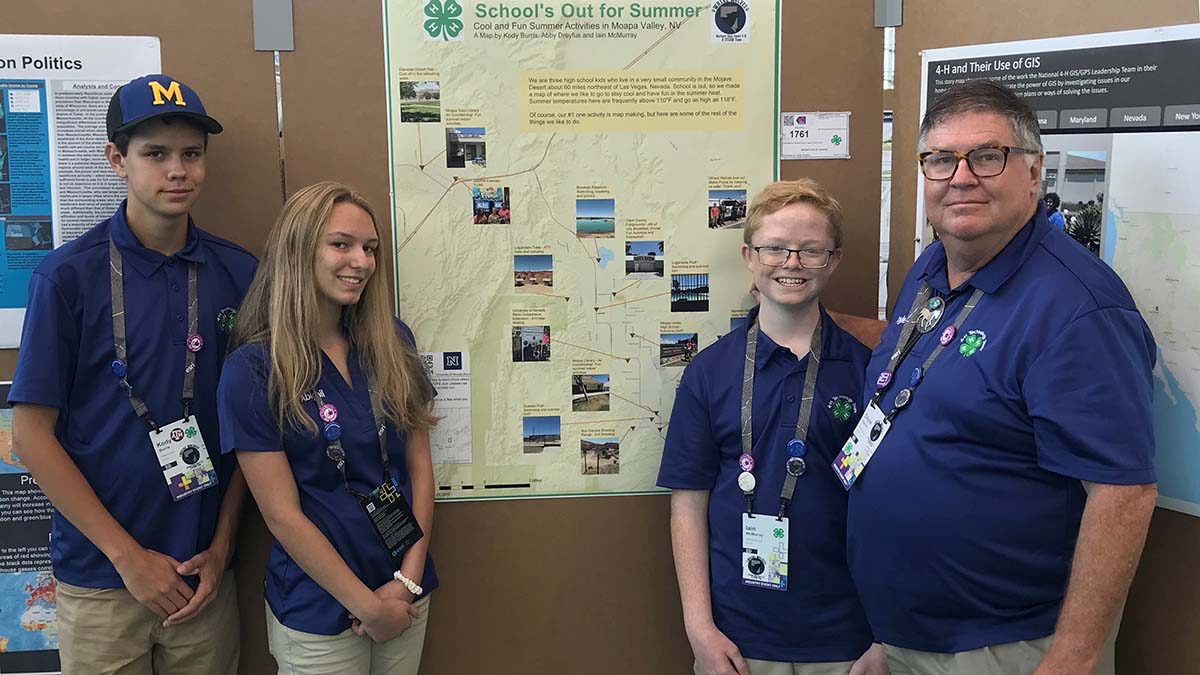 From left: Where Wolves 4-H GIS/GPS Club members Kody Burris, Abby Dreyfus and Ian McMurray, with Club Advisor Doyle Raines, show a map that they made of Moapa Valley. The map was displayed at the Environmental Systems Research Institute Users Conference in July.
From left: Where Wolves 4-H GIS/GPS Club members Kody Burris, Abby Dreyfus and Ian McMurray, with Club Advisor Doyle Raines, show a map that they made of Moapa Valley. The map was displayed at the Environmental Systems Research Institute Users Conference in July.
Three members of the [Moapa Valley] Where Wolves 4-H Club, along with three of their leaders, were recently selected to represent the state of Nevada as part of the National 4-H GIS Team at the annual Environmental Systems Research Institute (ESRI) conference held in San Diego.
The National team was made up of 12 youth and 11 leaders from across the United States. Local 4-H team members Abby Dreyfus, Kody Burris and Iain McMurray were selected through an interview and application process. The teens worked hard for months to prepare displays for the conference, with the help of their club advisors Doyle and Peggy Raines. National team members were the only youth allowed to attend the prestigious conference alongside over 17,000 adult attendees that came from all over the world.
The why behind the science of where
“A lot of people ask why we are called the Where Wolves," Club Advisor Doyle Raines said. "It’s because we believe in the science of where, not only for where we are, but where these kids are going.”
University offers agricultural crop research tours at Fallon Field Day
Research being done on drought-tolerant and salt-tolerant crops
By Tiffany Kozsan
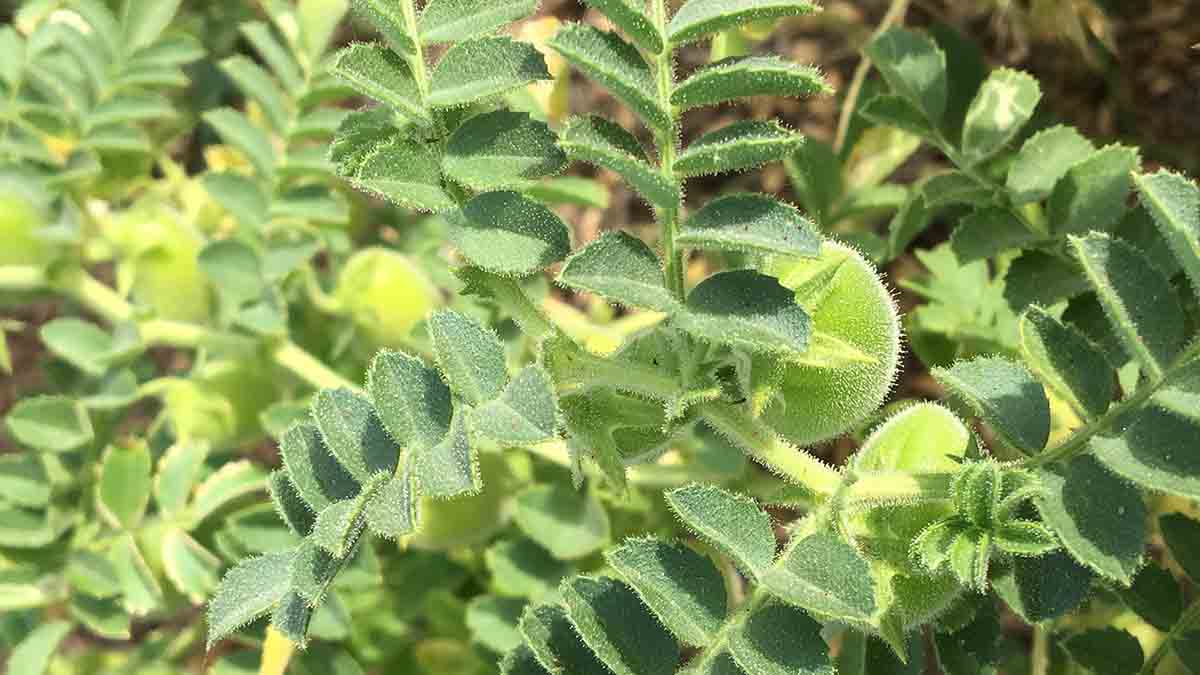 Chickpeas are one of the crops being researched by University of Nevada Cooperative Extension at the Nevada Agricultural Experiment Station Newlands Research Center. Photo by Maninder K. Walia.
Chickpeas are one of the crops being researched by University of Nevada Cooperative Extension at the Nevada Agricultural Experiment Station Newlands Research Center. Photo by Maninder K. Walia.
Agriculture producers and others were invited to get a first-hand look at crop trials and research being conducted in northern Nevada by the University of Nevada, Reno’s College of Agriculture, Biotechnology & Natural Resources. Field Day in Fallon was free and open to the public, and took place 9-11 a.m., Aug. 13, at the College’s Nevada Agricultural Experiment Station Newlands Research Center at 2053 Schurz Highway.
“The limited amount of water available for crop production is posing challenges for long-term sustainability,” said Maninder K. Walia, field crop specialist with University of Nevada Cooperative Extension, also part of the College. “So we are testing new crops to reduce Nevada’s water use.”
Nevada agricultural producers often contend with drought
To help them, our researchers identify, evaluate and make marketable crops that use less water than traditional crops while returning equal or higher profits.
Molly Flagg Knudtsen | Her story is College history
Cattle rancher, historical preservation advocate, educator, 1915-2001
By Tiffany Kozsan
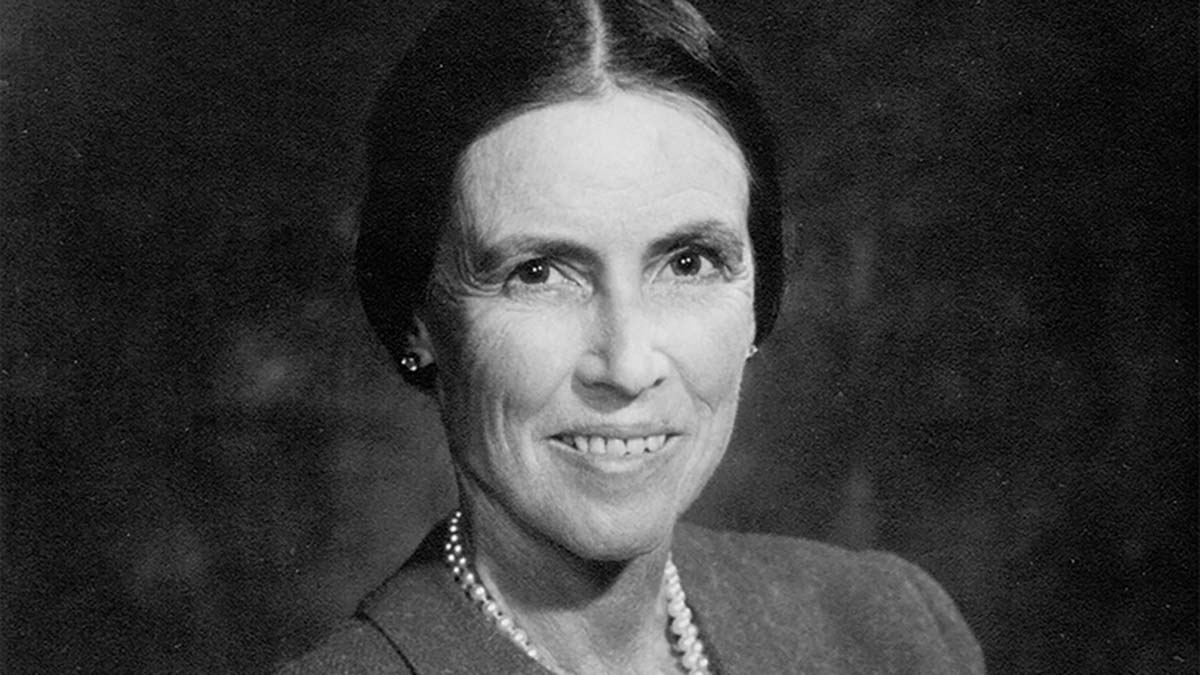 Molly Flagg Knudtsen was named Outstanding Agriculturalist of the Year by the College in 1973. The College’s Knudtsen Resource Center, named after her, turns 100 this year.
Molly Flagg Knudtsen was named Outstanding Agriculturalist of the Year by the College in 1973. The College’s Knudtsen Resource Center, named after her, turns 100 this year.
The College’s Knudtsen Resource Center, located at 1000 Valley Road in Reno, turned 100 this year. Below are some highlights of the life and contributions of Molly Flagg Knudtsen, after whom the building was named.
- Born in New York City in 1915 to a wealthy family, she was privately schooled and took riding lessons
- Attended University of London’s King’s College in England
- Came to Nevada in 1941 to obtain a divorce from Robert Pinkerton Gibb
- Married Richard Magee in 1942 and moved to his ranch in Grass Valley in Lander County
- Learned about bovine psychology and how to register purebred Hereford cattle, which had been developed by the University of Nevada, Reno’s College of Agriculture and purchased by Magee
- Published historic articles in “Vogue,” “Family Circle,” the “Rees River Reville” newspaper and various archeology magazines
- Became a trustee of the Nevada State Museum due to her work with mapping archeological sites and collecting and documenting artifacts around Nevada
- In 1960, became the first woman to run for and be elected to the University of Nevada Board of Regents
- Helped expand the College of Agriculture and establish the University of Nevada Press, the University’s Department of Anthropology and the community college system
- Bought the Grass Valley ranch from Magee in 1968 when Magee moved to California
- Divorced from Magee and married Bill Knudtsen in 1969
- Expanded the Grass Valley Ranch to 9,000 acres and improved and preserved the lineage of both the purebred herd and a commercial herd
- Named Outstanding Agriculturalist of the Year in 1973 by the College
- Awarded an honorary Doctorate of Science degree in archeology-anthropology by the University in 1975
- Published “Cow Sense” in 1977 through the University of Nevada Press
- Served on the Bureau of Land Management advisory boards and as an advisor for the College
- Named a Distinguished Nevadan by the University in 1994
More information on Molly Flagg Knudtsen can be found at nevadawomen.org or by reading her biographical sketch by Don D. Fowler in “The Maverik Spirit: Building the New Nevada,” edited by Richard O. Davies.
Molly helped shape the system of higher education we have today
She helped expand the College of Agriculture and establish the University of Nevada Press, the University’s Department of Anthropology and the community college system
Photo gallery | Building a herd of partnerships at the Smith Creek Ranch
By Bureau of Land Management (BLM) Nevada
Smith Creek Ranch, a Carson City District permittee, hosted a gathering of agencies, partners and researchers to talk about the efforts that they are putting in to make the ranch sustainable and successful for the future. Sam Lossing, cattle manager, and Ray Hendrix, owner/operator, helped organize a two-day event with over 50 attendees. The goal was to share with other permittees and agencies what can happen when working together with agencies and the positive resource management outcomes with interested partners.
The group toured various sites of the Smith Creek allotment that have research and monitoring projects from the College of Agriculture, Biotechnology & Natural Resources; Nevada Department of Wildlife; Bureau of Land Management Nevada; Natural Resources Conservation Service (NRCS); and Nevada Department of Agriculture, to name a few.
Removal of pinyon juniper trees for wildlife habitat, stream and watershed monitoring, and meadow exclosures are just some of the projects taking place year-round on the allotment. The ranch is also a part of the BLM Outcome-Based Grazing demonstration projects.
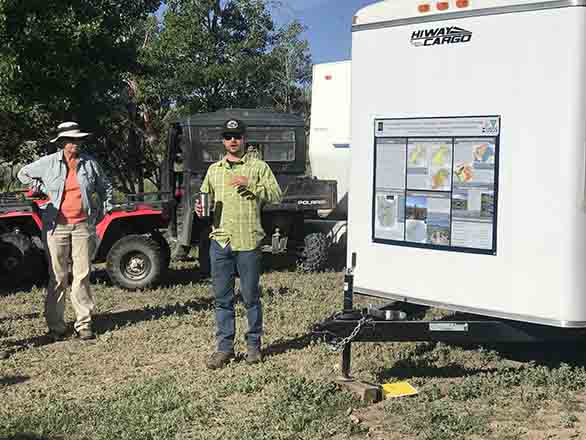
Lucas Phipps, with the Nevada Agricultural Experiment Station, explains one of the projects to the group before heading out to see the results on the ground. Photo by Bureau of Land Management Nevada.
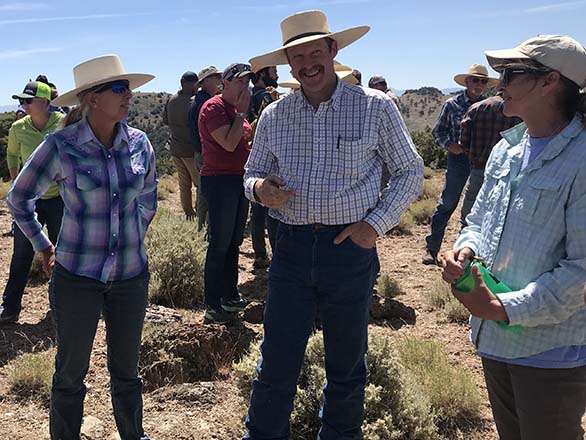
Smith Creek Ranch Manager Sam Lossing, center, discusses projects with representatives from cooperating agencies. Photo by Bureau of Land Management Nevada.
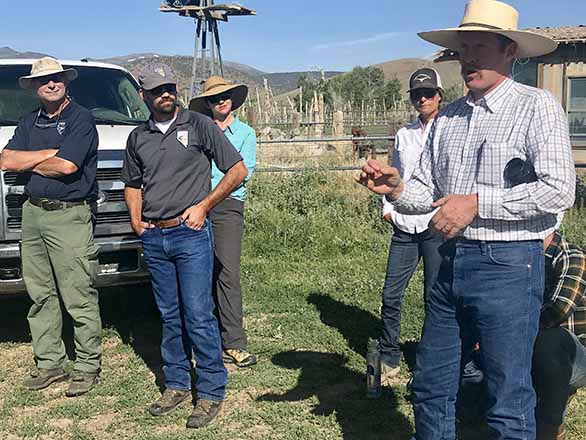
Smith Creek Manager Sam Lossing, right, gives his perspective on the work the University and the Bureau of Land Management Carson City District have implemented on his allotment. Photo by Bureau of Land Management Nevada.
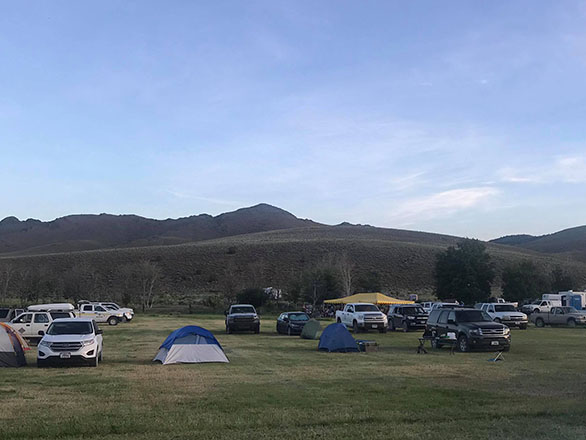
Evening accommodations at the Smith Creek Ranch for the meeting. Photo by Bureau of Land Management Nevada.
Smith Creek Ranch shows what happens when partners come together
Did you know? Smith Creek Ranch has hosted the Nevada Youth Range Camp, a camp for youth ages 14-18, since 1960. The camp is a collaboration between the College and multiple state and federal agencies.
National leader in renal disease joins University
Dietician and Nutritionist David St-Jules joins the College of Agriculture, Biotechnology & Natural Resources
By Hannah Alfaro
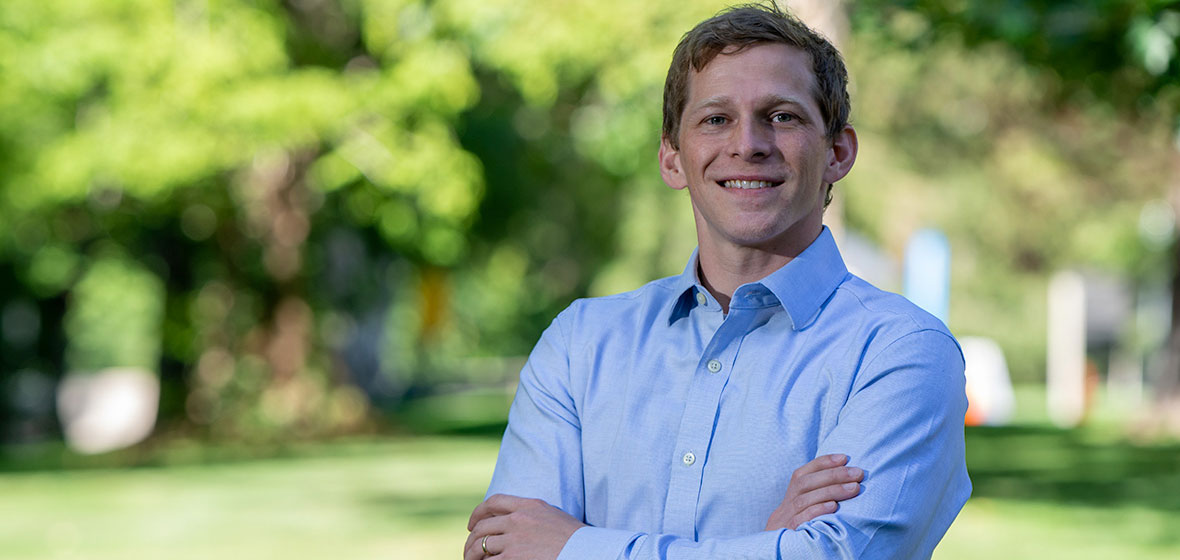 David St-Jules will continue to develop research on renal disease, as well as mentor graduate students.
David St-Jules will continue to develop research on renal disease, as well as mentor graduate students.
University of Nevada, Reno is excited to welcome David St-Jules to the College of Agriculture, Biotechnology & Natural Resources. He is a registered dietitian and nutritionist, and his research focuses on renal disease, which is the final and most severe stage of chronic kidney disease.
St-Jules’ decision to focus on this disease came from his interest in obesity-related chronic diseases, which are currently major concerns of the population. Renal disease is understudied and has not received as much attention from the medical community as diseases such as diabetes, even though 15 percent of U.S. adults are diagnosed with it.
“I’m excited to be transferring to the University since it has an established dietetics program with a good reputation that I know will support my research,” said St-Jules. “The school has a great environment, and I’m excited to get to know the faculty and staff there.”
St-Jules completed two postdoctoral fellowships at Harvard School of Public Health and the New York University School of Medicine for Nutrition. He now plans to continue his research into renal disease and build the evidence base for treatment.
Immediate plans include studying the role of registered dietitians in medical nutrition therapy and the use of technology in the treatment of pre-dialysis patients. He also aims to perform basic research on plant-based diets and their effectiveness in treating individuals with chronic kidney diseases. St-Jules looks forward to using his experience as a nutritionist to mentor graduate students who are interested in nutrition research.
"We’re excited to be bringing a national leader in renal disease to this institution,” said Jamie Benedict, chair of the College’s Department of Nutrition. “Dr. St-Jules is going to complement the strengths of our current faculty and help to enhance the research, teaching and outreach efforts of the Department of Nutrition.
The final and most severe stage of chronic kidney disease is understudied. St-Jules will change that.
“I’m excited to be transferring to the University since it has an established dietetics program with a good reputation that I know will support my research.”
Growing a stronger Nevada
Our programs work together to make an impact
Our teaching, research and engagement programs are intertwined and complement one another. Faculty who teach on campus also conduct research as part of the Experiment Station, allowing students to learn about and participate in research. Extension faculty engaging with communities identify research needs, as well as join Experiment Station faculty to conduct research. Faculty on campus help to develop Extension programs in communities.
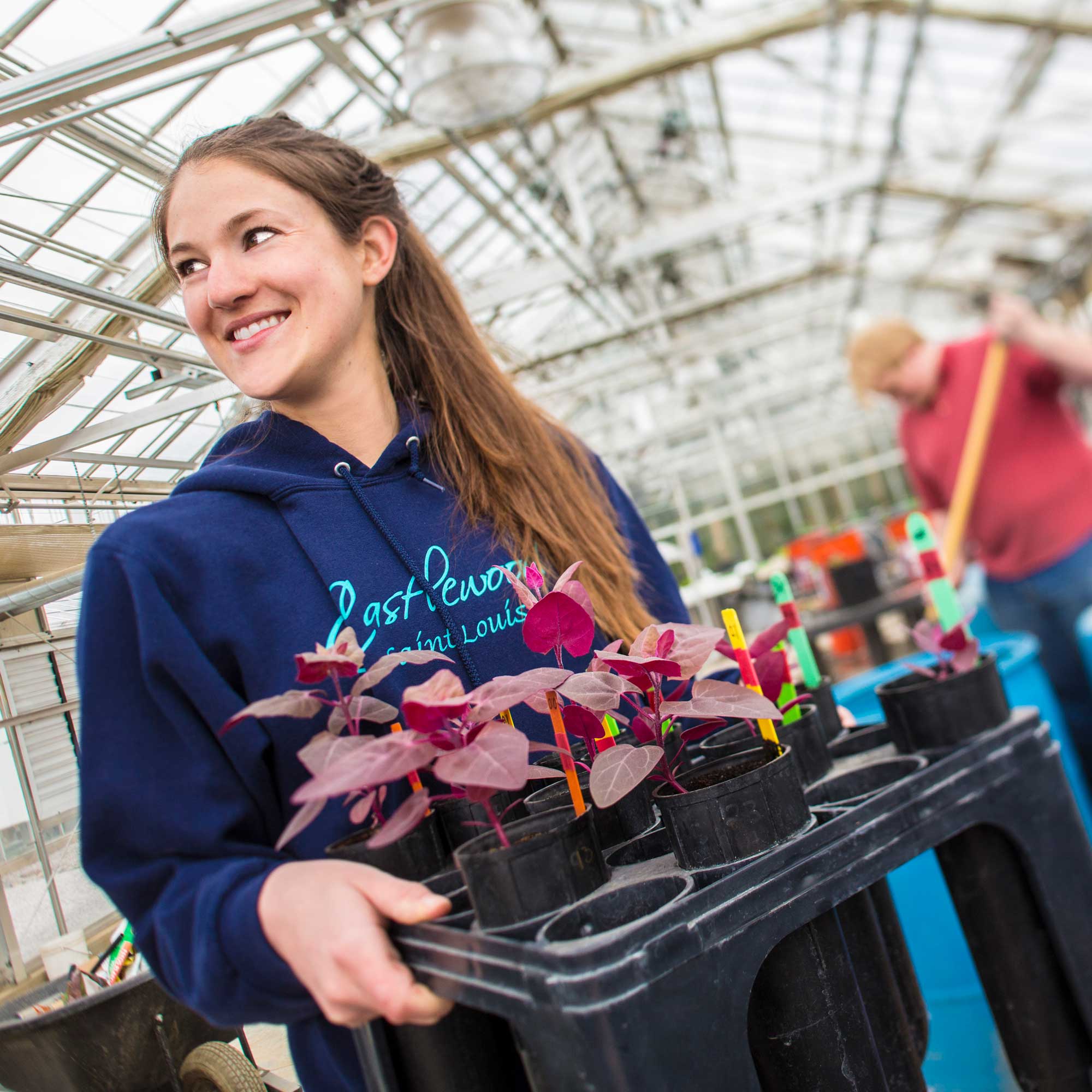
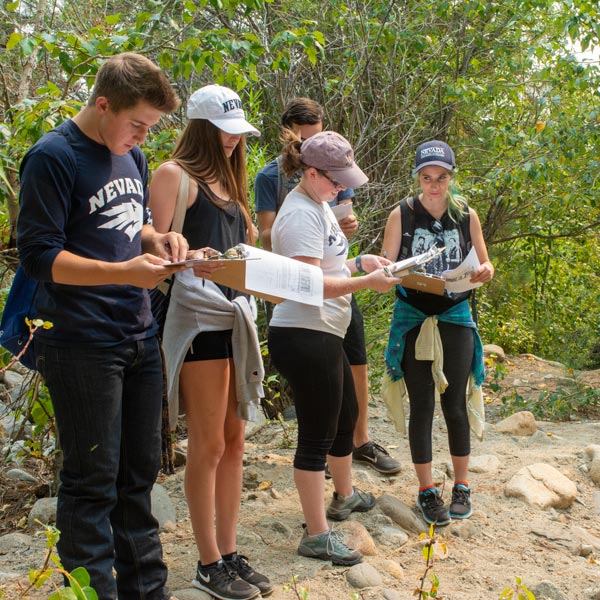
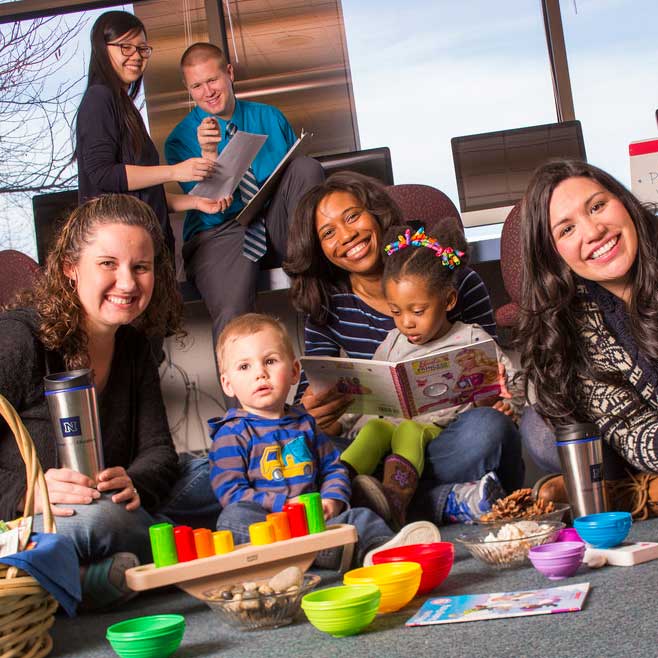
Want to help grow Nevada?
Consider making a contribution in support of classroom, lab or office space; graduate assistantships; student scholarships; or upgrades to Nevada 4-H Camp. To learn more, please contact Mitch Klaich '02, director of development, at 775-682-6490.